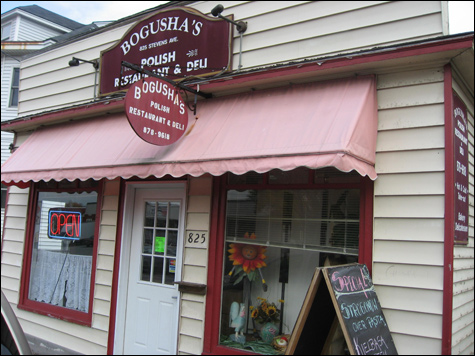
LIKE YOUR GRANDMOTHER'S HOUSE: Bogusha's.
|
|
Bogusha’s Polish Restaurant & Deli | 825 Stevens Ave, Portland | 207.878.9618
|
Though iPhones are eye-popping and hybrid cars emotionally snazzy, the furthest font of technology and culture is not fulfilling on its own. The latest and greatest are like a sugar rush on our souls, giving us a fast, cheerful, really good feeling that yields inevitably to time passing, scratched and worn surfaces, dead batteries, and our corresponding emotional response: either an acute sadness at the specific loss of the item’s zing or a sourceless numbness (je ne sais quoi’s evil twin). Either is usually counteracted by getting another fix: a new haircut, new boots, a flat-screen TV.
Instead, may I suggest a trip to Bogusha’s on Stevens Avenue, to get something to eat? What she serves is so old-school, it doesn’t come in and go out and come in again. It just is, as it has been for hundreds, maybe thousands, of years in the Pomeranian Lakes region in northwest Poland, a place where all kids grow up foraging for boletes in undisturbed forests with their families and mothers have been teaching daughters how to give their chicken soup that deep golden color and the je ne sais quoi that really does chase the flu away.
For those whose ancestors came from Poland, a visit to Bogusha’s is a visceral connection to your past through the very same food your relatives ate: stuffed cabbage, pierogis, meat and potato stews. The tangy smell in the air is like a grandmother’s hug. For those whose ancestors came from elsewhere, a trip to Bogusha’s is like a quick and very inexpensive European vacation.
For 11 years, Bogusha’s customers have been presumably the 500 Polish immigrants living in Maine, and US-born citizens whose parents and grandparents grew up in Poland and nearby territories in Russia and the Ukraine. They come for potato pancakes, and the authentic hand-made sausages, which look related to Italian favorites in gourmet charcuterie cases, but a little bit more chunky, rough-Northern-European-rustic. The kielbasa she gave me was not bright red and uniformly plump with smooth skin, but wrinkled and brown, like a sausage casing, hand-packed with scrap pork, salt, garlic, and fat, and then smoked, should look: not superficially appealing, but appealing for its clear disregard for superficiality. You can use it sliced thinly on the bias for antipasto or sauté chunks of it with halved Brussels sprouts, or use it to try to make bigos, a hearty stew that just might save your soul this holiday season.
Hidden behind the casual café tables, the corner-store-like shelves filled with cans of beef goulash, smoked herring fillets and mackerel salad, and glass jars of gnome-like fare (pickled foraged mushrooms and cured sorrel leaves) is the small kitchen. “Like home,” says Bogumila “Bogusha” Pawlaczyk, who has four pots simmering on the black cast-iron stove. One pot is sauerkraut bubbling off its sour bite. Another pot is about four gallons of fresh-sliced green cabbage, which is to cook down by half. Those two pots will be drained and combined with sautéed onions, kielbasa, bacon, and a touch of tomato, and simmered slow and low to make bigos. “More time you heat again, next day better,” she says with her thick Polish accent, her tongue fluttering right behind her front teeth. She explains: “Boil cabbage absorbs good smoke flavor.” In Poland she explains, they cook it long and low for what sounds like days, until all the ingredients just fall apart. “In the US, they want to know what they eat.” So she cooks the stew less and slices the cabbage thicker. The version she makes for her customers is still mushy, but its lack of that razor-sharp edge, its lack of micro greens, of fresh anything, is ironically, quite refreshing. Finally, she says, “We have in our genes to eat bigos.” No matter where we’re from, I think we all do.
Email the author
Lindsay Sterling:
lindsay@lindsaysterling.com